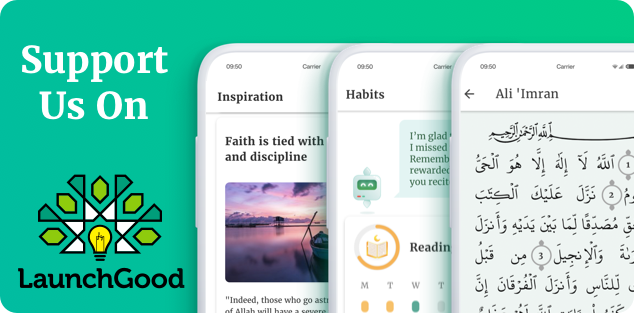** A nightly appointment with an angel **
In Ramadan, the Prophet Mohammad PBUH would be blessed with a nightly appointment with angel Jibreel who’d mutually study with him the Qur’an.
Describing this and its effects, Ibnu ‘Abbaas said:
كَانَ رسول الله – صلى الله عليه وسلم – أجْوَدَ النَّاسِ، وَكَانَ أجْوَدَ مَا يَكُونُ في رَمَضَانَ حِيْنَ يَلْقَاهُ جِبْريلُ، وَكَانَ جِبْريلُ يَلْقَاهُ في كُلِّ لَيْلَةٍ مِنْ رَمَضَانَ فَيُدَارِسُهُ القُرْآنَ، فَلَرَسُولُ الله – صلى الله عليه وسلم – حِيْنَ يَلْقَاهُ جِبرِيلُ أجْوَدُ بالخَيْرِ مِن الرِّيحِ المُرْسَلَةِ
“The Messenger of Allah was the most generous of people, and he was most generous in Ramadan when Jibril would meet him. He’d meet him every night during Ramadan and study the Quran with him. When Jibreel would meet him, the Messenger of Allah was more generous in doing good than the blowing wind.”
(Al-Bukhari and Muslim)
The greater the dosage of Qur’an, the greater the generosity of the Prophet PBUH would become, or, you could say, the more he learned, the more he did.
Our era is one of information overload. It’s not just the weekly Friday sermon that we’re blessed with, regular study circles in Mosques, and weekend courses, but the internet has completely removed every limitation on knowledge acquisition. Hence, there must be a recurring point in the life of every Muslim where s/he pauses and asks:
“My knowledge is growing, but is it causing me to grow?”
“I’ve learned something new today. What next?”
It’s these questions that’ll cause our knowledge to become an argument for us on the Day of Reckoning, on a Day when knowledge will be an argument against so many!
Abdul A’laa AtTameemi said:
من أوتي من العلم ما لا يبكيه فخليق أن لا يكون أوتي علماً ينفعه؛ لأن الله –عز وجل- نعت العلماء:
“Whoever gains knowledge that does not cause him to cry then such a person has not gained beneficial knowledge. This is because Allah said in a description of the scholars:
إِنَّ الَّذِينَ أُوتُوا الْعِلْمَ مِنْ قَبْلِهِ إِذَا يُتْلَى عَلَيْهِمْ يَخِرُّونَ لِلْأَذْقَانِ سُجَّدًا * وَيَقُولُونَ سُبْحَانَ رَبِّنَا إِنْ كَانَ وَعْدُ رَبِّنَا لَمَفْعُولًا * وَيَخِرُّونَ لِلْأَذْقَانِ يَبْكُونَ وَيَزِيدُهُمْ خُشُوعًا
“Those who were given knowledge before it – when it is recited to them, they fall upon their faces in prostration, And they say: “Glory be to our Lord! Truly, the Promise of our Lord must be fulfilled.” And they fall upon their faces weeping, and the Qur’an increases them in humble submission.”
Imam Ahmad said:
ما كتبتُ حديثاً عن النبي-صلى الله عليه وسلم- إلا وقد عملتُ به
“There isn’t any Hadith that I’ve written down except that I first applied its teaching.”
Unlike us, the likes of Imam Ahmad had memorized hundreds of thousands of narrations but he made an effort to apply each and every one of them.
He knew that the Prophet PBUH had cupping therapy and gave the therapist one Dinar, so Ahmad had cupping therapy and gave the therapist a Dinar. He also knew that the Prophet PBUH hid in a cave for three days during his escape from Mecca and so Ahmad spent three days in a cave as well.
A student of knowledge one spent the night at Imam Ahmad’s house and so Ahmad placed for him a container of water in his room so that he can carry out Wudoo for his night prayer. When Ahmad came to him at Fajr time, he noticed that the water hadn’t been moved from its place, so he said:
سبحان الله!، رجل يطلب العلم، ولا يكون له ورد بالليل!
“SubhanAllah, a student of knowledge who doesn’t pray at night?”
Al-Hasan Al-Basri said,
كان الرجل إذا طلب العلم لم يلبث أن يُرى ذلك في بصره ولسانه ويده وصلاته وتخشعه وزهده
“In the past, when a person would start his journey of knowledge, the effects of his learning would begin appearing in his glances, words, hands, prayer, humility and minimalism.”
Abu Qilaaba said to his student, Ayyoob AsSikhtiaani,
إذا أحدث الله لك علماً فأحدث له عبادة ولا يكن همك أن تحدث به
“If Allah gives you a new bit of knowledge, then give it a new bit of worship, and do not make your main intention the teaching of this knowledge.”
Sufyan Ibnu ‘Uyayna said:
إِذَا كَانَ نَهَارِي نَهَارَ سَفِيهٍ ، وَلَيْلِي لَيْلَ جَاهِلٍ ، فَمَا أَصْنَعُ بِالْعِلْمِ الَّذِي كَتَبْتُ ؟
“If I’m spending my hours during the day foolishly and my nights ignorantly then what is the point of the knowledge that I’m writing?”
Beneficial knowledge causes a person to grow in Allah’s Eyes but to drop in one’s own.
Beneficial knowledge causes one to cry over his weak self and the long journey that lies ahead.
Beneficial knowledge pesters the believer, persistently demanding its right of application, till it is applied.
Subscribe for Updates
Original content used with permission from:






